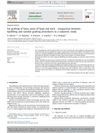 10 citations,
September 2020 in “Metabolites”
10 citations,
September 2020 in “Metabolites” Hair color and length affect metabolite profiles in hair, so they should be considered in hair analysis.
 February 2023 in “Malaysian Journal of Science. Series B, Physical & Earth Sciences”
February 2023 in “Malaysian Journal of Science. Series B, Physical & Earth Sciences” Analyzing bear poop helps measure their stress without harming them.
 145 citations,
November 2018 in “Nature Communications”
145 citations,
November 2018 in “Nature Communications” The Sonic hedgehog pathway is crucial for new hair growth during mouse skin healing.
 117 citations,
March 2017 in “Nature Communications”
117 citations,
March 2017 in “Nature Communications” Macrophages help regrow hair by activating stem cells using AKT/β-catenin and TNF.
 36 citations,
January 2019 in “Nature communications”
36 citations,
January 2019 in “Nature communications” High lactate dehydrogenase activity is not necessary for the growth of squamous cell carcinoma.
 57 citations,
November 2017 in “Nature Communications”
57 citations,
November 2017 in “Nature Communications” Researchers found 71 genetic regions linked to male pattern baldness, which account for 38% of its genetic risk.
 50 citations,
July 2021 in “Nature Communications”
50 citations,
July 2021 in “Nature Communications” The drug enzalutamide may reduce the ability of the virus causing COVID-19 to enter lung cells.
 40 citations,
March 2019 in “Nature Communications”
40 citations,
March 2019 in “Nature Communications” CRAC channels are crucial for the development and function of specialized immune cells, preventing severe inflammation and autoimmune diseases.
 22 citations,
May 2021 in “Nature Communications”
22 citations,
May 2021 in “Nature Communications” Tissue stiffness affects hair follicle regeneration, and Twist1 is a key regulator.
 9 citations,
February 2022 in “Nature communications”
9 citations,
February 2022 in “Nature communications” Rare changes in the KRT82 gene are linked to a higher risk of Alopecia Areata.
 35 citations,
May 2021 in “Nature communications”
35 citations,
May 2021 in “Nature communications” The skin's basement membrane has specialized structures and molecules for different tissue interactions, important for hair growth and attachment.
 April 2024 in “Scientific reports (Nature Publishing Group)”
April 2024 in “Scientific reports (Nature Publishing Group)” Rosemary and neem extract may be an effective natural treatment for dandruff and hair loss.
 12 citations,
February 2021 in “Translational Psychiatry”
12 citations,
February 2021 in “Translational Psychiatry” Researchers found two new genetic variants linked to Alzheimer's disease.
 May 2023 in “Scientific Reports”
May 2023 in “Scientific Reports” The seed extract of Lepidium sativum L. can potentially treat hair loss, showing effects similar to 5% minoxidil.
 55 citations,
May 2014 in “Journal of feline medicine and surgery”
55 citations,
May 2014 in “Journal of feline medicine and surgery” Combining systemic and topical treatments, guided by weekly fungal cultures, effectively treats cat ringworm.
 February 2023 in “Scientific Reports”
February 2023 in “Scientific Reports” Cold Atmospheric Microwave Plasma (CAMP) helps hair cells grow and could potentially treat hair loss.
October 2020 in “M/C Journal” Society's view of "freaks" has shifted from natural deformities to extreme plastic surgery, reflecting changing beauty standards and pressures.
 15 citations,
September 2014 in “JAMA Dermatology”
15 citations,
September 2014 in “JAMA Dermatology”  64 citations,
March 2017 in “Nature communications”
64 citations,
March 2017 in “Nature communications” Researchers found 63 genes linked to male-pattern baldness, which could help in understanding its biology and developing new treatments.
 31 citations,
May 2019 in “Nature communications”
31 citations,
May 2019 in “Nature communications” Single Blimp1+ cells can create functional sebaceous gland organoids in the lab.
 3 citations,
January 2011 in “Female pelvic medicine & reconstructive surgery”
3 citations,
January 2011 in “Female pelvic medicine & reconstructive surgery” Hormones significantly affect women's sexual function, and more research is needed to improve treatments for sexual dysfunction with minimal side effects.
 8 citations,
April 2019 in “Australasian Journal of Dermatology”
8 citations,
April 2019 in “Australasian Journal of Dermatology” The article suggests a treatment plan for a stubborn scalp condition common in elderly Australians to help improve their lives.
 96 citations,
June 2017 in “Nature Communications”
96 citations,
June 2017 in “Nature Communications” A WNT10A gene mutation leads to ectodermal dysplasia by disrupting cell growth and differentiation.
 4 citations,
May 2022 in “Future Journal of Pharmaceutical Sciences”
4 citations,
May 2022 in “Future Journal of Pharmaceutical Sciences” Melatonin-loaded microemulsion could be a promising treatment for hair loss.
 February 2024 in “International neuropsychiatric disease journal”
February 2024 in “International neuropsychiatric disease journal” Alopecia areata severely impacts quality of life, mental health, and work productivity.
 6 citations,
June 2018 in “Journal of Stomatology, Oral and Maxillofacial Surgery”
6 citations,
June 2018 in “Journal of Stomatology, Oral and Maxillofacial Surgery” Nanofat grafting is better for delicate areas and combining it with lipofilling might improve hair loss treatment.
 September 2023 in “Research Square (Research Square)”
September 2023 in “Research Square (Research Square)” The document concludes that the new expert system can assess the risk of PCOS effectively despite uncertainties in diagnosis.
 May 2023 in “BMC Women's Health”
May 2023 in “BMC Women's Health” Many women who have used performance-enhancing drugs in Finland show high rates of mental health and substance use issues, and most have normal red blood cell counts.
 1 citations,
December 2022 in “BMC Plant Biology”
1 citations,
December 2022 in “BMC Plant Biology” The black orchid Brasiliorchis schunkeana produces chemicals that attract certain insects and have potential antimicrobial properties.
 7 citations,
January 2022 in “Scientific Reports”
7 citations,
January 2022 in “Scientific Reports” Acanthus ebracteatus Vahl. extract and verbascoside may help prevent hair loss and promote hair growth due to their anti-inflammatory properties and ability to protect against cell death.





























